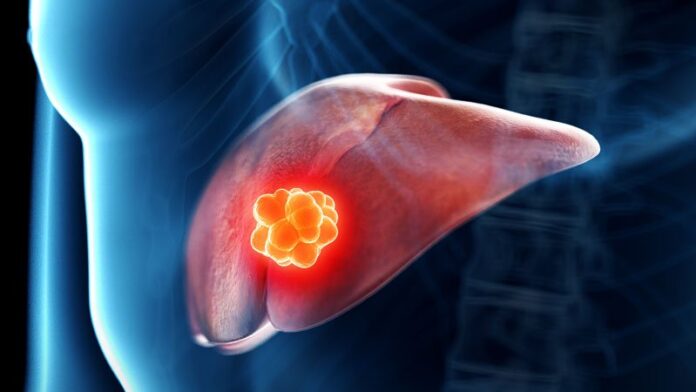[ad_1]
Long-term follow-up data show a continued benefit for patients with advanced hepatocellular carcinoma (HCC) treated with nivolumab and ipilimumab after disease progression on sorafenib, according to investigators from the Checkmate 040 trial.
At a minimum follow-up of 44 months, the 3-year overall survival rate ranged from 30% to 42% in patients who received three different nivolumab-ipilimumab regimens, reported Anthony B. El-Khoueiry, MD, of the University of Southern California in Los Angeles.
“Durable responses were achieved across treatment arms, with the duration of response approaching 4 years in some cases,” El-Khoueiry said at the 2021 Gastrointestinal Cancers Symposium (Abstract 269).
The Checkmate 040 trial was designed to compare second- or later-line therapy with the two checkpoint inhibitors at two different dose schedules, followed by maintenance therapy, plus a third continuous therapy arm.
The trial included 148 patients with advanced HCC who experienced disease progression on sorafenib or could not tolerate the drug. They were randomly assigned on a 1:1:1 basis to receive:
-
Nivolumab at 1 mg/kg plus ipilimumab at 3 mg/kg every 3 weeks for 4 cycles, followed by nivolumab maintenance at 240 mg every 2 weeks (nivo 1 + ipi 3).
-
Nivolumab at 3 mg/kg plus ipilimumab at 1 mg/kg every 3 weeks for 4 cycles, followed by nivolumab maintenance (nivo 3 + ipi 1).
-
Nivolumab at 3 mg/kg every 2 weeks plus ipilimumab at 1 mg/kg every 6 weeks until disease progression or unacceptable toxicity (nivo 3 + ipi 1 Q6).
Based on earlier results of this trial, the nivo 1 + ipi 3 dose with nivolumab maintenance was approved in the United States for patients with advanced HCC previously treated with sorafenib.
Table of Contents
Four Years On
“Response outcomes at 44 months of follow-up were consistent with the primary analysis,” El-Khoueiry said.
The overall response rate at the most recent follow-up was 32% for nivo 1 + ipi 3, and 31% in each of the other arms.
The disease control rate – a combination of complete and partial responses and stable disease – was 54% in the nivo 1 + ipi 3 arm, 43% in the nivo 3 + ipi 1 arm, and 49% in the nivo 3 + ipi 1 Q6 arm.
The 36-month overall survival rates were 42%, 26%, and 30%, respectively. Kaplan-Meier curves for overall survival for both the primary analysis and the long-term follow-up displayed a survival advantage for nivo 1 + ipi 3 compared with the other two arms.
Safety
Treatment-related adverse events occurred more frequently in the nivo 1 + ipi 3 arm, which investigators attribute to the higher dose of ipilimumab. The most common grade 3 or 4 events in this arm were elevated liver enzymes and hyponatremia.
Immune-related adverse events also occurred more frequently in the nivo 1 + ipi 3 arm.
“Most immune-mediated adverse events were reversible and resolved when treated using an established algorithm, with steroids being the most common immune-modulating medication used. There were no additional discontinuations due to immune-mediated adverse events during the longer follow-up,” El-Khoueiry said.
Best Combination?
“It’s certainly good data, and we’re happy about the response rate of about 30%, and that was confirmed at [the Gastrointestinal Cancers Symposium] with further follow-up of these patients,” said Lipika Goyal, MD, of Mass General Cancer Center in Boston.
Whether the nivo/ipi combination will turn out to be the optimum choice for patients with advanced HCC is still unknown; however, many different combinations of checkpoint inhibitors with or without tyrosine kinase inhibitors are currently being explored, and have not been compared in head-to-head trials, Goyal said in an interview. Goyal was not involved in the Checkmate 040 study.
Checkmate 040 was supported by Bristol Myers Squibb. El-Khoueiry disclosed honoraria from and consulting/advising for the company and others. Goyal reported no relevant disclosures.
The Gastrointestinal Cancers Symposium is sponsored by the American Gastroenterological Association, the American Society for Clinical Oncology, the American Society for Radiation Oncology, and the Society of Surgical Oncology.
This article originally appeared on MDedge.com, part of the Medscape Professional Network.
[ad_2]
Source link












